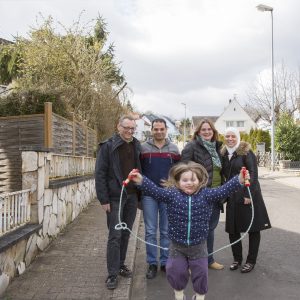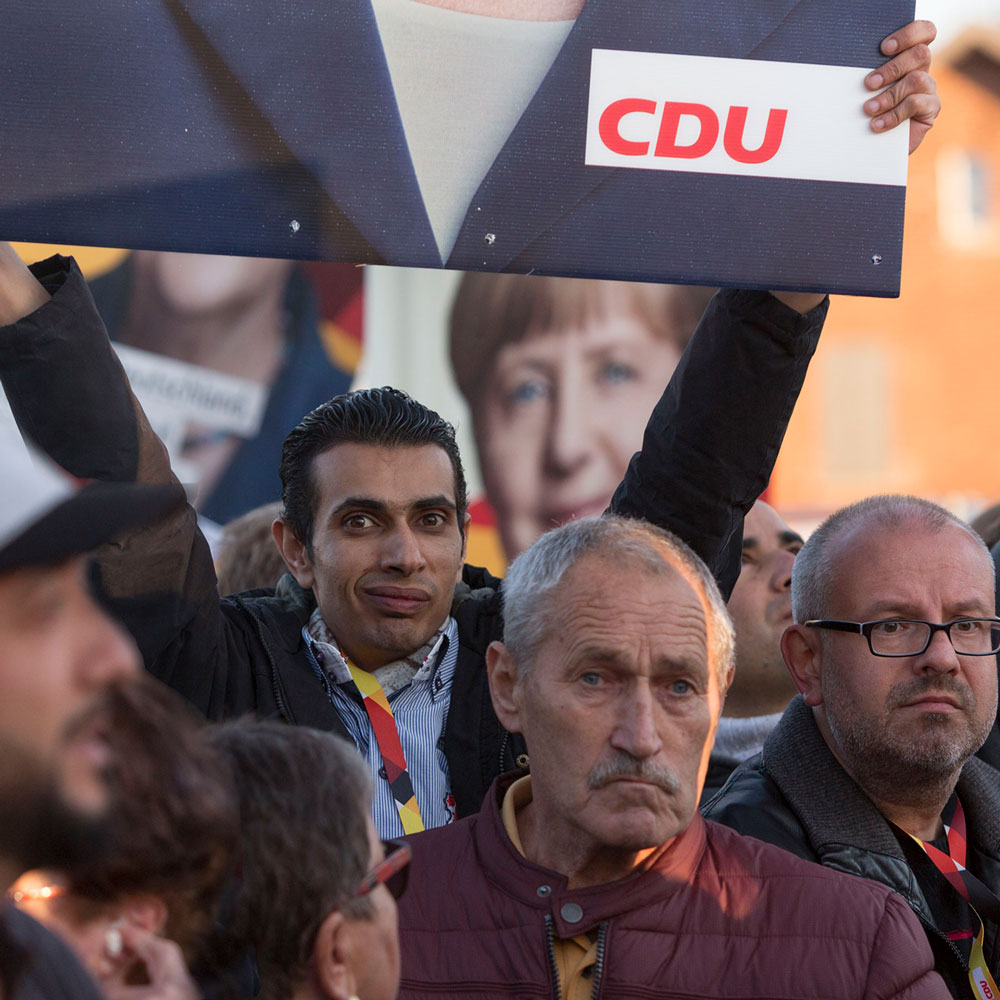“It`s gotta be smelling like home”
Actually, Hossein Fayazpour wanted to cook at noon for managers in an office complex. Then the city accommodated refugees there. The top chef yet stayed.
Text: Benno Stieber
Photos: Jochen Sand
Published in Enorm-Magazin 01 / 2016
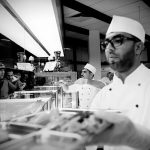
The sky hangs low and grey over the Grünwinkel industrial estate in Karlsruhe. It has been raining for days. Under the canopies of the former bank building, which is now a first refuge for refugees, men with raised collars are crouching. It is shortly before noon, Hossein Fayazpour sits in a white kitchen montour in a damp party tent. “This is our recreation room,” says the 49-year-old. All rooms in the building are occupied. So his crew takes a break outside. Drinking coffee, smoking before going back inside to the main meal-serving. Right now, at 12:30pm it’s lunch time, about 1,000 people in the house are hungry.
In other institutions there have been mass brawls, because the food distribution didn’t work or the supply was bad. Not so in Kalrsruhe. Hossein Fayazpour is not particularly proud of it. It may be that the food in other institutions is reduced to a question of internal security. He wants to make it the highlight of the day for the refugees. Hossein Fayazpour is the “Chef de Cuisine” here. He cooks freshly and largely does so without convenience products, flavour enhancers and other tricks. Food is a medium to reach people’s hearts,” says the refugee chef.
Actually, everything was planned quite differently. After years in top gastronomy, Hossein Fayazpour and his team had just set up in the former canteen kitchen of the insurance building. He had developed a concept to supply schools and kindergardens with affordable organic food. A business model with high standards. The children should not only be satisfied, but also learn to distinguish between healthy and unhealthy food. The kitchen of the former canteen was just it.
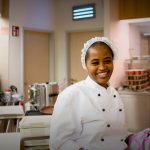
The landlord had promised that companies would move into the upper floors of the office building the next months. IT companies, of which there are so many in Karlsruhe. Fayazpour and his team were to cook for them on daily base, too, which sounded like good business. And then there was the mother-child café, which the entrepreneur wanted to run during the day and on weekends. Fayazpour`s business ideas sprout like other people’s hair on their heads.
The Asia decoration for the mother-child caffé is now standing undecidedly on the wall of the small office next to the canteen kitchen. The day the restaurateur wanted to go public with his café concept, a letter came from the regional council. They told him that instead of programmers and accountants, up to 1500 refugees would move into the office building. It was to become the initial reception facility for refugees. The location was ideal for reception and recording.
The authorities and the landlord came up with a choice that was not actually a choice. He and his kitchen could stay and take care of the refugees, or he could resign and move out. When he had read the letter, Fayazpour remembers, he first turned off his cell phone and made a three hours walk. The next day the first busses arrived.
Today Hossein Fayazpour supplies refugees three times a day, sometimes 1200, sometimes only about 500. At the moment it has become calmer,” he says. But not only the refugees, but also the employees of the regional council and the security service are his guests. “Here in the house we are all enjoying the same food”, says Fayazpour. That was his condition if he would take over the catering. This signal was important to him.
His team is now three times as big as before, he employs cooks and helpers from 14 nations. They can give information to the refugees in their native language and so the menu can be adapted a little to their eating habits. Food, he says, is above all a means for him to reach people. “It should smell like home”. This is why curcuma, lamb and bulgur come into the pot when, as now, the refugees in the house mainly come from the Middle East. Pork is not used at all. Fayazpour finds that arriving also goes through the stomach.
12:30h pm. Mealtime. Hossein’s kitchen crew is standing at the bar, the minced lamb steaks, the tomato sauce and the saffron-coloured couscous are steaming in the display. Actually, the door is supposed to open now, but the security guards don’t release it. Hossein gets angry and rebukes the man in the orange waistcoat: “People have been waiting long enough, now open the door“.
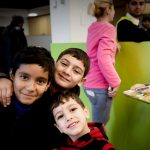
Hossein Fayazpour knows this feeling of powerlessness in a refugee home. He himself came to the Germany as a refugee from Iran over 30 years ago. As a student he had briefly sniffed the air of freedom after the fall of the Shah, before the Ayatollahs suffocated all that again. Fayazpour’s parents were afraid for their son and sent him away. He ended up in Karlsruhe with tractors via Tashkent, Moscow and East Berlin. His first culinary experience was a steamed noodle with apple sauce. “This sweet and salty. I thought it was terrible,” he remembers. Today, after such a long time in Germany, he even loves it.
Now Fayzpour is back in the refugee home. He says: “We are in the right place here, we can do something meaningful”. With the city’s lump sums for food, he can calculate well, pay his people and himself sensibly and still realize his claim of good food.
Back then, when the letter came from the regional council, Fayazpour first phoned his tax advisor, who is also a friend. When he told him that he was now cooking for refugees instead of IT people, he just said, “Hossein, you remind me of Forrest Gump. “If life gives you lemons, make it lemonade.” Fayazpour thinks that is a good motto for Germany today.


